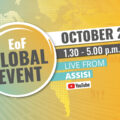
Workshop
#daretocare | Ideas for the Holidays!

In this article we give you some tips to live these holidays in a more sustainable way.
During the holidays we know that there are plenty of moments of family, friendship, generosity, nostalgia and traditions. And there are traditions that are very nice and others that are perhaps not so good… because without realising it, we repeat habits that are not good for the environment and that, moreover, are very easy to change!
Here you have 5 ideas that will make a big difference during this holiday season:
1. Wrap your Christmas presents in a vintage and original style! Use old newspapers as wrapping paper and finish off the artwork with a bow made from twine and Christmas berries. 🎄🍒
On Christmas, let’s #DareToCare! pic.twitter.com/S5RIqtdnUj
— United World Project (@UWP_official) December 17, 2021
In Canada alone, 540,000 tonnes of wrapping paper (equivalent to the weight of 100,000 elephants) end up in landfills after the holidays (source: globalnews.ca).
2. Replace plastic cups with glass cups (reusable) and place a label to identify the name of the person using each cup. This will avoid unnecessary use of disposable plastics and water.
In addition, when washing dishes, 8 liters of water are wasted per minute, which is equivalent to 40 liters with the faucet running for 5 mins. #daretocare pic.twitter.com/hHvpFPyKIH
— United World Project (@UWP_official) December 19, 2021
Every year, 300 million tonnes of plastic waste is produced, which is equivalent to the weight of the entire human population.
In addition, washing dishes wastes 8 litres of water per minute, which is equivalent to 40 litres with the tap running for 5 minutes (source: expansión.mx).
3. Go for cloth napkins instead of paper ones.
Are you ready to celebrate the holidays guilt-free? This is our third #DareToCare tip. Go for cloth napkins, instead of paper. pic.twitter.com/hjQmZVR1MW
— United World Project (@UWP_official) December 20, 2021
According to the Guide to Responsible Purchasing produced by the Union of Consumer and User Cooperatives of Madrid, non-recycled paper napkins emit more CO2, and use more energy and water in their manufacture than cotton or cloth napkins. Thus, if you use 300 virgin fibre paper napkins a year, according to this guide, you will have emitted almost 7 kilos (kg) of CO2 into the atmosphere and consumed 484 litres (l) of water necessary for their manufacture.
4. Avoid using fireworks during the festive season.
🎆❌ Do you usually buy fireworks during holidays? Here’s why one #daretocare way to celebrate is to avoid buying them. pic.twitter.com/Ef1VxUJVsO
— United World Project (@UWP_official) December 21, 2021
By avoiding this tradition, we generate all these benefits:
- Reduce the pollution produced by gunpowder and explosions.
- You do not contribute to child labour (in many countries it has been proven that fireworks factories employ children).
- You contribute to the mental health of many people who suffer from the noise and lights produced by fireworks.
- You contribute to not generating a crisis in many animals that are affected by its noise.
- You will have a more responsible consumption and less expenses.
5. When you’re going to cook think about the number of people who are going to actually eat (we often cook too much food!). And then, you can also prepare bags or boxes so that you can share the leftovers and not throw away any of the delicious food you have prepared. If you want to decorate the boxes with the recipient’s name and some applications like cinnamon sticks or glitter designs, you will make the ecology even brighter!
❌No food waste during Holidays! In the world, one third of food is lost or wasted; in December, the problem can double due to the large amount of food used for Christmas and New Year's Eve celebrations.#DareToCare pic.twitter.com/6Y0G1c5pvZ
— United World Project (@UWP_official) December 21, 2021
Worldwide, one third of food is lost or wasted; in December, the problem can double due to the large amount of food used for Christmas and New Year’s Eve festivities. A large part of the products and dishes prepared during these festivities end up in the rubbish, when they could still be fit for human consumption. Some people prepare more than they need and others buy more than they will use, without taking into account all the resources needed to produce the food and the pollution they are producing in the water, air and soil.
According to a report by the Food and Agriculture Organisation of the United Nations (FAO), the food that is produced and not consumed is responsible for adding 3.3 billion tonnes of greenhouse gases to the atmosphere. (Source: elcomercio.com)
Let’s #daretocare during this holiday season!






